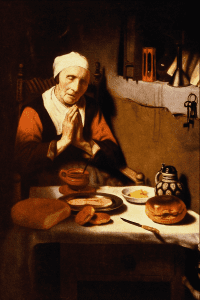
One of the many things I find endearing about my husband is that he thanks me when I do the most ordinary things—roll up the socks, sort the mail, pick up the groceries I always pick up. Kale again—thank you. Some of the tasks I do for our mutual well-being are simply my part of a fair distribution of labor, part of the rhythm of shared life, not unusual gestures of kindness, simply doing my part, as he does his. But thanking each other for small things has, I think, added an extra dimension of happiness to a happy marriage.
Gratitude is a practice, a habit of the heart, an orientation, a way of seeing, a form of wisdom. A lot has been written and said about cultivating an “attitude of gratitude,” identifying five things a day to be grateful for, and even understanding gratitude from a scientific point of view. Here, for instance, are a few websites that offer a range of cheering reminders of the goodness of gratitude: happify.com; unstuck.com; tinybuddha.com; lifehack.org; stratejoy.com; spiritualityhealth.com; thechangeblog.com; productivemuslim.com; explorefaith.org . . . etc. Christians, Buddhists, Muslims, Hindus and other faith groups as well as many who claim no particular faith have gone public in praise of this life-giving practice.
Identifying what we are grateful for is, indeed, a valuable way of noticing, as we go along, how much of life is given, and gift. How much we receive without our own efforts, from the generosity of others’ labor and of the abundant earth and of the Creator who spoke it all into being and holds it as it struggles and evolves. And gratitude is a good antidote to discouragement, depression, cynicism, and even despair—things many feel particularly acutely during the holiday season, and some especially this year as the election has raised so many deeply unsettling questions about our life together.
But an archaeology of gratitude can also take us beyond helpful habit to deep, existential layers of self-understanding that remind us that life itself is a gift, that we live and move in mystery, that perhaps gratitude is a foundational grasp of who we are and how we are to live. That two basic instructions for growing into the lives we’ve been given are simply these: “Say yes. Say thank you.” We may leave the “you” in that sentence open wide to imaging and interpretation, but that thanks is due is a matter of remarkable agreement among most of us when we are being our most humble, human, and humane.
Image: Nicholas Macs, “An Old Woman Praying,” from Wikimedia Commons












